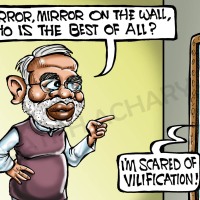CAMPAIGN FOR AFFORDABLE TRASTUZUMAB
8 March 2013
The Campaign for Affordable Trastuzumab has called on the Commerce Minister to mark International Women’s Day 2013 with an announcement of compulsory licensing for Trastuzumab, a life-saving drug for women with HER2+ breast cancer. Trastuzumab, the patent for which is held by Swiss pharma giant Roche, is currently priced at Rs.6-8 lakhs for a full course of 12 injections, and is out of reach for all but the most privileged. An estimated 25,000 new cases of HER2+ breast cancer are recorded in India every year, with younger women in the majority among patients.
Trastuzumab has been recommended for compulsory licensing by an Expert Committee set up by the Health Ministry. The recommendation is currently under the consideration of the Department of Industrial Policy and Promotion in the Ministry of Commerce.
The Campaign has urged the Minister to issue a notification under Sections 92 and 100 of the Indian Patents Act, which will end Roche’s monopoly and open the door for local manufacturers to enter the market with affordable biosimilar versions that can compete with Roche’s product.
The letter cites evidence to show that Roche’s pricing policy is irrational and unethical, reflecting its strategy of pushing the pricing envelope to the maximum extent possible.
The Campaign has also cited compelling evidence to show that measures such as negotiated price reductions and voluntary licensing floated by the Ministry of Chemicals and Fertilisers are weak in comparison to the option of compulsory licensing, which can bring prices down four times more than price negotiations. Moreover, while negotiated prices will apply only in India, Indian generics/biosimilars have the potential of increasing access across the developing world.
The letter expresses concern at the Government of India’s apparent reluctance to use the compulsory licensing option to ensure access, even though this measure is available under the Indian Patents At which was amended in 2005 to make it TRIPS-compliant. The first compulsory licence awarded in India – for production of a generic competitor to the liver cancer drug Sorafenib – has been recently upheld by the Intellectual Property Appellate Board.
The Campaign is endorsed by more than 150 Indian and global groups of cancer survivors, health rights activists, women’s groups, treatment activists and public interest organisations.
The full text of the letter is given below.
To the Hon’ble Minister for Commerce, Government of India
Compulsory licensing for breast cancer drug Trastuzumab
Respected Minister,
Greetings from the Campaign for Affordable Trastuzumab on International Women’s Day.
We are writing to you to enquire about actions taken by your Ministry on the recommendation from the Expert Committee set up by the Ministry of Health to explore the possibility of issuing compulsory licences (CLs) for encouraging the entry of low-cost generic/biosimilar versions of cancer drugs in cases where patents and predatory pricing policies of multinational pharma companies continue to block access to these medicines for the vast majority of patients in India.
Breast cancer drug Trastuzumab on short list for compulsory licensing
Trastuzumab, a patented drug that can save the lives of women suffering from HER2+ breast cancer, has been recommended for compulsory licensing by the Expert Committee set up by the Health Ministry. The patent for the drug is held by Roche and is valid for another seven years. This patent, weak though it is, is discouraging local manufacturers from investing in the development of biosimilars of Trastuzumab that can provide affordable alternatives to Roche’s product.
The recommendation for compulsory licensing of Trastuzumab was welcomed by us as a huge relief to the thousands of women with HER2+ breast cancer whose lives can be saved by Trastuzumab, but who are unable to access this drug because of predatory pricing by Roche.
We surely do not need to remind you that breast cancer is now the second most common form of cancer in the country, and that young women constitute the majority of those affected by the aggressive HER2+ variant of the disease. An estimated 25,000 new cases of HER2+ breast cancer are reported each year.
Trastuzumab, often called a miracle drug for its efficacy in preventing recurrence and extending life in cases HER2+ breast cancer, is currently priced at between Rs.55,000/- and Rs 75,000/- per 440 mg dose, and is therefore out of reach for all but the wealthiest. An oncologist at the Tata Memorial Cancer Centre has been quoted as saying that less than 10% of the patients he sees are able to afford Trastuzumab at all, and even fewer are able to complete the recommended course of 12 injections. This is borne out by the testimonies of other survivors and their families1.
The recommendations of the Expert Committee were under consideration by the Department of Industrial Policy & Promotion (DIPP) under your Ministry. Since then, we – and thousands of women who are battling HER2+ breast cancer – have been waiting for a notification from DIPP that will open the door for domestic manufacturers to invest in the development, testing and marketing of biosimilars of Trastuzumab.
We are mystified by the delay in the issuance of a notification under Section 92 of the Patents Act to initiate the process of compulsory licensing for Trastuzumab. The case for compulsory licensing presented by us in our letter to the Prime Minister in November 2012 (see attachment) have been endorsed by over 150 organisations and citizens including cancer survivors, women’s groups, human rights organisations, health NGOs and treatment activists from around the world and eminent jurists. Our argument has now been validated by the recommendations of the Expert Committee of the Ministry of Health.
Discount schemes are no match for generic competition
There is plenty of evidence to show that Roche’s pricing and marketing policy is completely arbitrary and unethical. The so-called “voluntary price reductions” announced by Roche – from Rs.1.2 lakhs to Rs.92,000/- and then to Rs.75,000/- – each time the issue of over-pricing is raised, are merely pre-emptive measures to ward off competition and retain their control of the market. Roche is also using market segmentation to protect its monopoly. Trastuzumab is being sold under two different brand names – Herceptin (Roche) at Rs.1.2 lakhs for 440 mg, and Herclon (Emcure) for Rs.75,000/-.
There is also evidence of a nexus between Roche and doctors in private hospitals – patients are being pressurised to buy the drug from the hospital pharmacy at the official price of Rs.75,000/- per dose, rather than from retailers and agents who offer the drug at prices as much as 25% lower than the MRP.
The Indian Railways has been procuring Trastuzumab for the last three year at Rs.86,957/- per dose2. This is also the amount reimbursed under the CGHS3.
These figures leave little doubt that Roche’s pricing policy is determined primarily by their assessment of how much they can push the price envelope rather than by the idea of an ethical profit margin.
Perhaps the Honourable Minister for Chemicals & Fertilisers was not aware of these details when he stated in the Lok Sabha that Roche would be bringing the price of Trastuzumab down to Rs.75,000/- per dose4 under an upcoming deal with Emcure for local manufacture. Considering that the present MRP of the drug is Rs.75,000/-, and it is already being offered by retailers for 55,000/- per dose, we fail to see anything to cheer about in the Roche-Emcure deal. In fact, there are reports that Roche has imposed anti-competitive terms such as a ceiling on volume of sales and a mandatory minimum price.
Negotiated prices do not expand access
Respected Minister, you are no doubt aware that the Department of Pharmaceuticals, Ministry of Chemicals and Fertilizers has recently released a report by a committee set up to examine the issue of price negotiations for patented drugs. We are concerned about the fact that this report being released at a time when a compulsory licence for Trastuzumab is under active consideration by both the Health Ministry and your Ministry.
While Roche’s actions in blocking any attempts at competition are understandable even if not justifiable, we are shocked that a government entity should seriously propose to negotiate with pharma majors without any reference to other concerned Ministries, and in complete disregard of global experience, which confirms that measures such as negotiated price reductions do not result in any significant expansion of access, since prices continue to remain beyond the reach of most citizens. Generic competition on the other hand can bring prices down to four times lower than negotiated prices 5.
Apart from yielding only limited benefits, time-consuming price negotiations with pharma companies can delay action on more rational options such as compulsory licensing, thereby putting thousands of lives at risk. The Government of Thailand, which began issuing compulsory licences in 2007, noted that “Prior negotiation with the patent holders is not an effective measure and only delays the improvement in access to patented essential medicines and puts more lives in less healthy or even dangerous situations.”
What is more, negotiated price reductions will be applicable only in India – a biosimilar of Trastuzumab from Indian manufacturers on the other hand have the potential for a global impact and can expand access to this life-saving drug across the developing world. India’s scientific and technical capacity in this sector is well recognised. The announcement of a compulsory licence for Trastuzumab will encourage local pharma firms to step up their investments in ongoing research projects for biosimilar development, and will facilitate the speedy entry of biosimilars into the market.
We have been greatly encouraged by the recent decisions of the Intellectual Property Appellate Board (IPAB) in revoking the patent for the Hepatitis-C drug pegylated interferon Alpha 2A, and now in upholding the compulsory licence for a generic competitor to Sorafenib. These decisions have been applauded and welcomed by health rights groups and public interest groups around the world, for whom they are an assurance of India’s political will to resist arm-twisting by pharma companies.
When India amended its patent laws in 2005 to make them TRIPS-compliant, there was widespread concern about the possible adverse impacts of this move on access to treatment. The then Union Minister of Commerce & Industry, Shri Kamal Nath had said at the time that “the government has built in enough safeguards in the Patents (Third Amendment) Act 2005 passed by Parliament to protect the interests of consumers by ensuring availability of medicines at affordable prices6. We are disappointed that eight years later, despite sharp increases in the number and prices of patented drugs, the Government of India is so reluctant to use the provision of compulsory licensing under Sections 92 and 100 of the Patent Act to expand generic competition, bring down prices and expand access.
We urge you to mark Women’s Day 2013 with the announcement of a compulsory licence for Trastuzumab – a progressive and principled step that will bring relief to thousands of Indian women and their families who are struggling to deal with HER2+ breast cancer and its economic, social and personal costs.
Thousands of lives are at stake – we look forward to your immediate and decisive action.
KALYANI MENON-SEN (on behalf of the Campaign for Affordable Trastuzumab)
5See attached press note for details.









